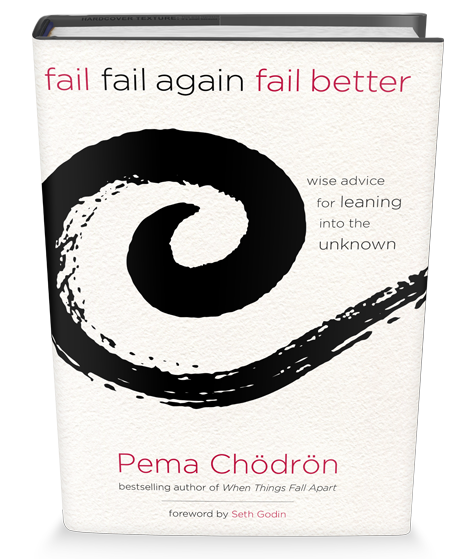Books |
Pema Chödrön: Fail, Fail Again, Fail Better: Wise Advice for Leaning into the Unknown
By
Published: Nov 03, 2015
Category:
Spirituality
GUEST BUTLER BETSY ELLIS, when not reading, is a Life Enrichment Specialist at Jewish Family Service of St. Paul and an artist. She loves nothing more than putting books in the hands of young readers and finding “the next read” for friends and family. She has recently reviewed The Rocks and In a Dark, Dark Wood.
As a student of Buddhism, I would like to say that I have read something by Pema Chödrön. The 79-year-old American Buddhist nun is beloved in the Buddhist world and has authored numerous books about compassion and being still and all that good Buddhist stuff, and she’s regularly praised on this site — here and here and especially here. But her books tend to sit in the book pile, and I never get around to them. It’s not her. For a while now I have been boycotting reading anything in the spiritual or self-help genre. I think I have burned out on the stuff.
Then I saw the title of her new book: “Fail. Fail Again. Fail Better.” And I thought, “Whaaaaat? This is pretty radical.”
Failure is a dirty word in my world. Failure leads quickly to shame, an uninvited and annoying friend that triggers the usually hidden feelings of my three year old inner child (fear of being invisible, left out, dismissed, wrong, bad, worthless, abandoned — – are we having fun yet?), leaving me to act out these feelings in my adult life, much to my confusion and embarrassment.
And here was a book that was going to encourage me to fail, and fail again. My stomach tightened. But I love it when my long-held beliefs get turned on their head, so I took the bait and plunged in.
In this commencement speech to the Naropa University graduating class of 2014 — her granddaughter was one of the students graduating — Pema Chödrön asserts that most colleges and universities work very hard to prepare students to be successful but pay very little attention to “the fine art of failing.”
She says that the feelings of failure are so raw and make us feel so vulnerable that we never learn how to just sit with those feelings. Instead we blame someone else or label ourselves “a failure.” We become failure. We let it be our identity. [To buy the book from Amazon, click here. For the Kindle edition, click here. For the audio book, click here. For the audio CD, click here.]
She used herself as an example, telling the students about what she felt was, at the time, the greatest failure of her life: the end of her second marriage. (She didn’t become a Buddhist nun until later in life.) “So when my second marriage ended, I could have said — and well, I actually would say to anyone who would listen — ‘This is the worst time of my life; my life is over. I am going to die,’ and so on.”
But then she suggests to the students that “maybe instead of doing the habitual thing of labeling yourself a ‘failure’ or ‘loser’ or thinking there is something wrong with you, you could get curious about what is going on.” She especially emphasizes becoming aware of your “internal discussion.” If there is a lot of self-criticism, ease up on yourself. “You may just need to sit with the hurt, the raw feelings.”
“The alternative is that out of that space of failure come addictions of all kinds —addictions because we are not wanting to feel it, because we want to escape, because we want to numb ourselves. Out of that space comes aggression, striking out, violence at others. Out of that space come a lot of ugly things. And yet out of that very same space of vulnerability and rawness and the feeling of failure can come our best human qualities of bravery, kindness, the ability to really care about each other, the ability to reach out to each other. “
There is so much rich material in this short jewel of a book, and you haven’t even gotten to the in-depth interview she gives to Sounds True publisher Tami Simon.
I will confess this book succeeded in turning my idea of failure on its head. Well, maybe not on its head, but it has chipped away a few more pieces of that granite-like shame and fear that sits in my gut. It has shown me that failure can contain the possibility of “unforeseen changes and creative outcomes.” I’m grateful for that.
BONUS VIDEO


